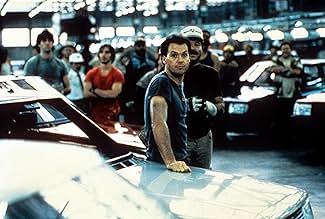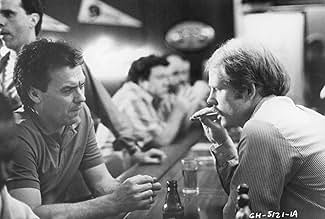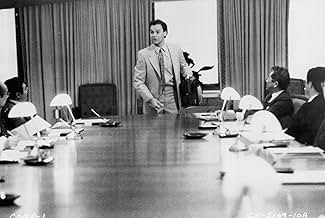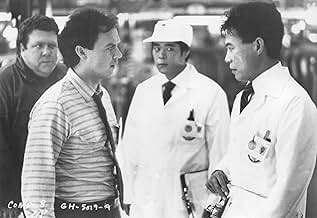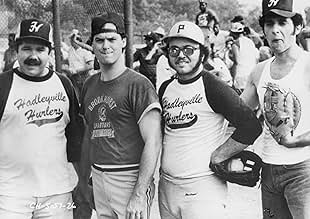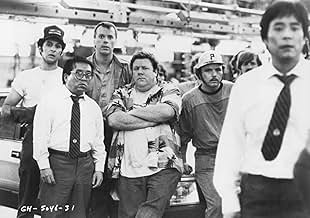Aggiungi una trama nella tua linguaWhen a Japanese automobile company buys an American plant, the American liaison must mediate the clash of work attitudes between the foreign management and native labor.When a Japanese automobile company buys an American plant, the American liaison must mediate the clash of work attitudes between the foreign management and native labor.When a Japanese automobile company buys an American plant, the American liaison must mediate the clash of work attitudes between the foreign management and native labor.
- Regia
- Sceneggiatura
- Star
- Premi
- 1 vittoria in totale
- Mr. Sakamoto
- (as Soh Yamamura)
- Umeki Kazihiro
- (as Patti Yasuiake)
Recensioni in evidenza
But let's face it: the movie isn't funny. Babaloo Mandel and Lowell Ganz are terrific writers ("Splash", "Parenthood") but they didn't create much moments we could say they were funny, most of the time is just using of caricatures to make some amusing moments, they barely work, maybe two or three scenes. Their concentration to the more engaging aspects was what made "Gung Ho" something really worth seeing. It pokes fun on the culture comparisons between U.S., specially when it comes to both nations traditions but it also establishes a greater sense of supporting each other, one might be better than the other but only together they come up with something bigger, better and stronger. Having a movie like this made on a decade where American superiority was presented in every single movie and also in politics is something of a miracle. It basically says: "We're no longer the strongest nation in the world, neither the most efficient but we can aspire to be if we follow some other examples around the world". Sure, it doesn't paint a fair picture for both sides (Japanese as workaholics who can't contest their bosses and Americans as lazy and incompetent), often recurring to stereotypes but presents something good out of those.
Although a little sloppy, clichéd and never serious enough, "Gung Ho" can be used as a source of inspiration, at least for those who have a company and doesn't know how to bring out the best with their employs, it's always there to bring out of the best of a team, push them to the limits and show them the advantages of following new directives. I know this movie is something of a classic between Administration students in here, and most of them enjoy it. Out of this department, it might be a disappointment for Keaton and Ron Howard fans, they're not at their best. The supporting cast formed with the likes of Mimi Rogers, George Wendt, John Turturro, Rance and Clint Howard save this for a bit, but the most interesting in scene is Watanabe, the funniest in the show.
In the end, it reaches its purpose of presenting a parallel between cultures, but never takes our fully enjoyment, neither much of our laughs. Easy to watch and quite motivational though. 7/10
"Gung Ho" does a better job of capturing the mood of the American industrial workforce than just about any other popular movie made during that period. Certainly the movie has its flaws -- some loose plot threads and mediocre acting jobs by everyone except Michael Keaton and Gedde Watanabe. But the story really is about the meeting of East and West: Keaton's Hunt Stevenson personifies America, brash and confident on the outside yet insecure underneath. Watanabe's Kazuhiro personifies Japan, on top of the heap with a successful system, but wondering if there is more to be learned from their Western rivals. The movie's plot, flawed as it is, simply provides a framework for the conflict, and eventually synthesis, of their two personalities.
Keaton's acting overshadows everyone else's, and practically makes the movie by itself. I've always admired Keaton for his ability to deliver lines that feel improvised, no matter what script he's following. His character, Hunt Stevenson, is a likable, affable everyman, a natural leader with a wise-ass streak. But he has a fatal flaw common to many of us: he doesn't want to disappoint anyone. He'll distract the crowd with inspirational anecdotes, and even lie, rather than point out the ugly truth.
Kazuhiro is the mirror image of Stevenson: shy and introspective, but also, because of his Japanese upbringing, reluctant to be the bearer of bad news. The scene in which Stevenson first comes to Kazuhiro with the employees' grievances captures perfectly the Japanese approach to workplace conflict. Kazuhiro replies to Stevenson's complaints with "I understand what you are saying," but won't refuse his requests out loud. Stevenson misinterprets this as agreement, and goes away saying, "Okay, we've got that settled." (This is still a problem in Japanese-American business relations in the 21st century!)
Ultimately, Kazuhiro and Stevenson have the same problem: get the factory working smoothly, meet production goals, and fulfill their responsibility to the workers under them. In working towards this goal, they each have to take a page from the others' book. Kazuhiro's family becoming more "Americanized" is an obvious example. Also note that Stevenson thinks it's odd when Kazuhiro explains how he had to make a public apology to his workers for failing them -- and yet, later in the movie, Stevenson does exactly that himself.
The plot and its resolution are a little cornball, but hey, this is a comedy. If you can overlook the movie's flaws, there is a great story about self-realization and open-mindedness here.
Director Ron Howard makes light-hearted fun from a difficult subject matter. For the most part, it works for me. It can be off-putting for an audience that is either pro or anti-union. Howard essentially splits the difference by having both workers and management come together in a happy ending. Michael Keaton is fun. He faces the challenge with charm. Another director would make this a tougher movie but Howard is not that guy.
There is plenty of comedy relief in the film, from culture clashes to slapstick humor. There's also bits of heroism in the film, including Hunt's town's survival being contingent on the car company staying afloat and including Japanese company manager Oishi Kazihiro (Gedde Watanabe) showing honor to his boss, colleagues and family in getting the car making job done.
Overall, an entertaining film with touches of Americana and Japanese cultures.
Grade B+
Lo sapevi?
- QuizAccording to Bloomberg Businessweek, Toyota executives later used the movie as an example of how not to manage Americans.
- BlooperWhen Hunt Stevenson meets the Japanese managers for the first time, they hand their business cards over with one hand. Japanese business protocol requires formally presenting business cards, holding them with both hands.
- Citazioni
Hunt Stevenson: If you walk out that door, you're going to miss a great comeback. We're ready to roll here, Jack.
Mr. Sakamoto: This will never be like a Japanese factory... *Jack.*
Hunt Stevenson: Oh, yeah? You're right. You know what else? So what?
Mr. Sakamoto: You failed.
Hunt Stevenson: Really? Wanna know something? I got one of the first cars ever made here. I got *the* first car ever - I don't think I want it anymore. As a matter of fact, here.
[hands keys to Mr. Sakamoto]
Hunt Stevenson: Why don't you take the keys, okay? I'd rather have one of those cars.
[points to cars in assembly line]
Hunt Stevenson: I'd rather have one of these cars that *we* made *together,* by hand. Your guys and my guys, together. You know why? Because those cars stand for something. Those cars stand for something pretty great. I'm proud of those cars. I'm taking one.
[Turns to workers]
Hunt Stevenson: Gentlemen, I'm going home in my new car!
[All workers cheer and applaud, then silently pray that Hunt's new car has a working engine. Hunt starts the car, and the workers cheer. However, the car literally falls apart after about two yards, and the workers start to moan. Hunter gets out of the car]
Hunt Stevenson: I tell ya, I thought it handled great!
- Versioni alternativeSome international editions distributed by Paramount on DVD, reduced the aspect ratio from original 2.39:1 to 2.09:1.
- ConnessioniFeatured in Generation X: The Power of Disruption (2016)
- Colonne sonoreDon't Get Me Wrong
Written by Chrissie Hynde
Performed by The Pretenders
Produced by Jimmy Lavine and Bob Clearmountain
Courtesy of Sire Records Company
I più visti
- How long is Gung Ho?Powered by Alexa
Dettagli
Botteghino
- Budget
- 18.000.000 USD (previsto)
- Lordo Stati Uniti e Canada
- 36.611.610 USD
- Fine settimana di apertura Stati Uniti e Canada
- 7.170.830 USD
- 16 mar 1986
- Lordo in tutto il mondo
- 36.611.610 USD
- Tempo di esecuzione1 ora 52 minuti
- Colore
- Proporzioni
- 2.35 : 1
Contribuisci a questa pagina



